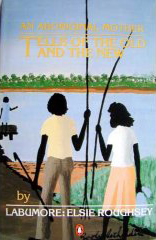FAQ for .before Country
This FAQ addresses comments and issues initially raised by bloggers and commentators on several blogs in December 2006. I may add more later. See my brief Writer's Statement for a little background.
You can download the free PDF of .before Country or as a less pretty RTF file.
As well you can buy it from amazon.com or Barnes & Noble, though it first appeared on amazon.co.uk.
Why use more than 2 fonts on the cover?
Because of the red line.

Seven Tells? Why use the word 'tell' like that?
There is a book called An Aboriginal Mother Tells of the Old and the New, but the title is layed out on the cover in such a way that it emphasises Tells of the Old and the New, and so elides between proper and Australian Aboriginal English. I've liked Tells ever since.
In Originary, what's with the uncapitalised 'i'?
The 'i' in Originary is not the voice of the author but of a parent after a sleepless night. Perhaps its use by the narrator expresses an insecurity and fear for the future of her child while maintaining a parental confidence or front. It use prefigures the interrogation of pronouns (the location of a speaker) in child rajer.In Exit Cave, snottites?
Snottities are real, though my version is made up.child rajer WTF?
An expressive prose poem about exile, and the future for all of us when everyone is on the dole (welfare). Written in 1986 while attending a SF writing conference in Sydney, it explores a singularity ridden future for those who live on backwater reservations. In part, it does this through an interrogation of how we locate the speech act in relation to what is said, and so questions who we are exactly, when we position ourselves (more self consciously) in language.BTW, the feeling of words are more important to the narrator than their dictionary meaning, as was the case in the culture rajer grew up in, in the 'Tubings'. Seeking purely semantic explanations will leave the reader bewildered, this holds for most of my so called 'cerebral' poetry as well. The feeling is more important when the self is lost or exiled (for example) when one's place in the world is destroyed. The feelings alone may remain but cannot recreate, not just yet, a new landscape, a new identity, until the old home is properly mourned.
Odd Punctuation ????
.maybe it refers to hidden files and directories in Unix style file systems .maybe it refers to the URL addressing system like dotcom .maybe it refers to the methods George Augustus Robinson used to transcribe native Tasmanian Aboriginal languages .maybe it refers to the punctuation used on gravestones on the Isle of the Dead, at Port Arthur, Tasmania
.maybe this is a protocol for an unspoken thought, while •this is spoken aloud
But what are code poems? (ad rajer, spikechild and ad rajer)
Code poems "overload" the date function (overload is progammer speak for making one routine do something its was not designed for in the first place, just like a metaphor does, I guess that's a metaphoric use of a metaphoric use (and that's recursion, the programmer's first great love...) Also, in programming, functions pass arguments (the values in brackets) to their subroutines where these values are further explored. These code poems mostly overload the date function, as they are, in part, investigations of diaries, logs, journals, blogs or any date focussed or index writing.advent among swan
The narrative of this looser code poem was inspired by a conversation with Julie Gough while she was talking about her piece Shadow of the Spear, 1997.
